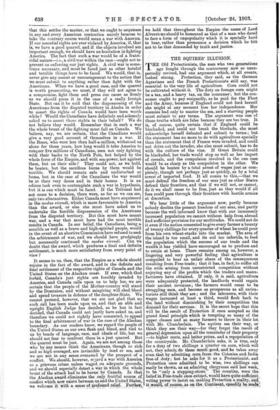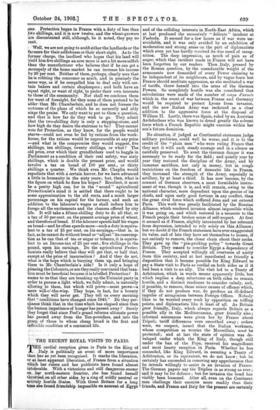THE SQUIRES' ILLUSION.
THE Old Protectionists, the men who two generations ago fought through the controversy now so unex- pectedly revived, had one argument which, at all events, looked strong. Protection, they said, as the German Agrarians and the French Protectionists still say, was essential to the very life of agriculture. Corn could not be cultivated without it. The duty on foreign corn might be a tax, and a heavy tax, on the consumer; but the con- sumer ought to pay resignedly, as he paid for the Fleet and the Army, because if England could not feed. herself she might at any moment lose her independence. Her enemies had only to master the sea, and a starving people must submit to any terms. The argument was one of those truths which are false because they are too true. It is, of course, quite certain that if England could be blockaded, and could not break the blockade, she must acknowledge herself defeated and submit to terms ; but the statement has no more to do with agriculture specially than the statement that if France were invaded, and could not drive out the invader, she also must submit, has to do With the culture of the vine. If Great Britain could be blockaded, her trade would stop as well, as her import of Cereals, and the compulsion involved in the one case would be as sharp as the compulsion in the other. We should be beaten by a total arrest of wages just as com- pletely, though not perhaps just as quickly, as by a tatal arrest of imported food. It all comes to this,—that we must defend the freedom of our seas just as other States defend their frontiers, and that if we will not, or cannot, do it we shall cease to be free, just as they would if all foes could pass through their frontiers with hostile armies at discretion.
We hear little of the argument now, partly because nobody doubts the present freedom of our seas, and partly because the well informed know that with our immensely increased population we cannot without help from abroad find sufficient provision for our multitudes. We could not do it even if the nation consented to give every farmer a bounty of twenty shillings for every quarter of wheat he could pour from his own wheat-stacks into the market. The area of the island is too small, and its soil too infertile, to feed the population which the success of our trade and the wealth it has yielded have encouraged. us to produce and to retain at home. There remains among us, however, a lingering and very powerful feeling that agriculture is compelled to bear an unfair share of the consequences resulting from Free-trade ; that it has, in fact; to suffer all the evils arising from unrestricted. competition without enjoying any of the profits which the traders and manu- facturers .have obtained. If only, it is said, agriculture were adequately protected, the landlords would regain their ancient - revenues ; the farmers would cease to be struggling men, and become as prosperous as all carica, turists still think they are ; and the labourers, with their wages increased at least a third, would flock back to the land without diminishing by their competition the demand for their services. It is the secret hope that this will be the result of Protection if once accepted as the grand fiscal principle which is tempting so many of the upper classes and so many farmers to throw in their lot with Mr. Chamberlain. The squires see their way, or think they see their way—for they forget the result of general depression upon all the remainder of their property —to higher rents, and better ,prices, and a repopulation of the countryside. Mr. Chamberlain asks, it is true, only for a duty of two shillings a Ai:ma-ter on corn, which will not, they admitcdo them muth;good, end ;he takes away even ,that by admitting corn._ from., the Colonies and India free of duty ; but he asks for it as a Protectionist, and Protection once admitted. to 'be Wise, two shillings can easily be shown,-as an admiring clergyman said last week, to be "only a stepping stone" The comities, were the belief, in Free-trade once extinct, would have quitesufficient voting power to insist on making Protection a. reality, and. it would. of conrse. as on the Continent, speedily be made .one. Protection began in France with a duty of less than two shillings, and it is now twelve, and. the wheat-growers are discontented still, although, be it noted, they pay no rent.
Well, we are not going to scold either the landlords or the farmers for their selfishness or their short-sight. As to the former charge, the landlord -who hopes that his land will 'viola him five shillings an acre more is not a bit more selfish than the manufacturer who believes that if he can get a monopoly of the home market he can increase his income by 20 per cent. Neither of them, perhaps, clearly sees that he is robbing the consumer as much, and in precisely the Same way, as if he compelled him to deal only with cer- tain bakers and certain shopkeepers ; and both have an equal right, or want of right, to prefer their own interests to those of the community. Nor shall we condemn them for 'want of foresight, for they none of them pretend to be abler. than Mr. Chamberlain, and. he does not foresee the outcome of the plans of which he so earnestly and ably sings the praise. We only want to put to them a question, and that is how far do they wish to go. They admit that the two-shilling duty is only a stepping-stone, and bow high do they desire the staircase to be ? They cannot Note for Protection, as they know, for the people would starve—could not even be fed by rations from the work- house, for the rations would be unprocurable at any price —and what is the compromise they would suggest, five shillings, ten shillings, twenty shillings, or what? The old prioe, over which their grandfathers used to haggle in Parliament as a condition of their real safety, was sixty Shillings, which is double the present price, and would involve a tax on bread of 100 per cent., or thirty shillings a quarter. We think even Mr. Chaplin would repudiate that with a, certain horror, for we have advanced a little in humanity in the sixty years ; but, then, what is the figure on which he fixes his hopes? Recollect, it must be a pretty high one, for in the " sound " agricultural Protectionist's mind it is settled that there ought to be some approximation to the old rents, and a much larger percentage on his capital for the farmer, and such an addition to the labourer's wages as shall induce him to forego all the excitements and the chances offered by city life. It will take a fifteen-shilling duty to do all that, or a tax of 50 per cent. on the present average price of wheat, and therefore of bread. If the labourer spends half his wages on bread—and he often spends more—such a duty is equiva- lent to a tax of 25 per cent. on his earnings,—that is, in fact, as he cannot do without bread or "adjust" its consump- tion as he can that of tea or sugar or tobacco, it is equiva- lent to an Income-tax of 25 per cent., five shillings m the Pound, upon his earnings. Do the agricultural Protec- tionists really believe that they will get that, or half that, except at the price of insurrection ? And if they do not, what is the hope which is buoying them up, and bringing them to Mr. Chamberlain's side? Is it only a hope of pleasing the Colonists, or are they really convinced that taxa- tion must be beneficial because it is labelled Protection? It seems to us that they are breaking up the Unionist party in order to pursue a light which, we fully admit, is naturally alluring to them, but which will prove—must prove—a mere will-o'-the-wisp. They hope, in fact, for a. bounty Whieti they will never get. .They tell us every morning that "conditions have changed since 1845." Do they per- obance think that in the time which has elapsed since then the human impatience of hunger has passed away ? Surely they forget that since Peel's grand reforms ultimate power lias passed away from the Ten-pounders, and. into the grasp of those to whom cheap bread is the first and inflexible condition of a contented life.























































 Previous page
Previous page